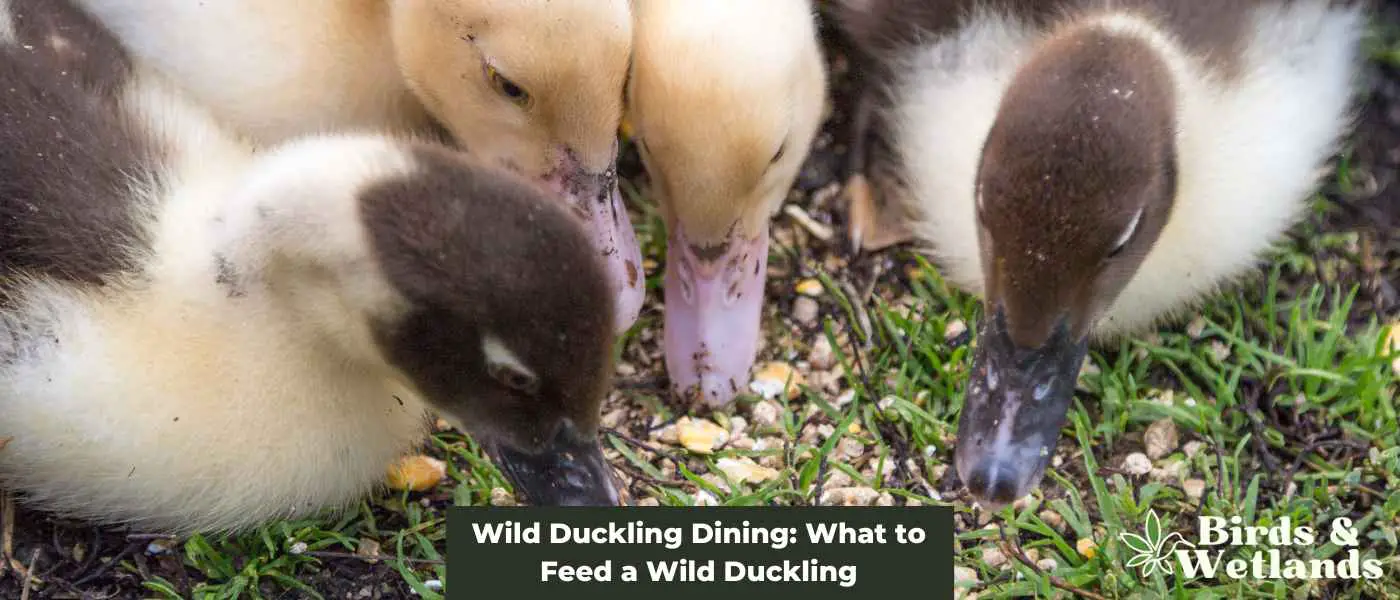Feeding a wild duckling should be approached with caution, as human intervention can disrupt their natural development. However, if you must provide temporary sustenance, offer a diet similar to what they would consume in the wild.
This includes small insects, such as mosquito larvae, daphnia, and brine shrimp, and finely chopped greens like lettuce, kale, or spinach.
Key takeaways:
Baby ducks should be given un-medicated duck or chick feed as their main diet to avoid overdosing on medication and to ensure they get the nutrients they need.
Supplementing their diet with fresh fruits, vegetables, and dried mealworms can provide them with extra nutrients and protein.
Brewer’s yeast can be added to their food to prevent niacin deficiency, which can cause bowed legs.
While crumbled bread can be given as a treat, it should not be the main component of their diet as it lacks the necessary nutrients.
Fresh water should be provided during feeding sessions to help baby ducks swallow their food easier without choking.
Uneaten food should be removed daily to prevent the ducklings from eating old food.
It’s important to wash your hands after feeding the ducks to avoid transferring germs from the ducklings to their food and water dishes.
If you find a lost baby duckling, provide it with a box with heated tissues and finely chopped celery, and contact a bird rescue if the mother does not return.
For adult wild ducks, their diet can vary, but grains, fruits, vegetables, and fish can be given in small pieces. Bread should be avoided as it can be harmful to them.
What to Feed a Wild Duckling
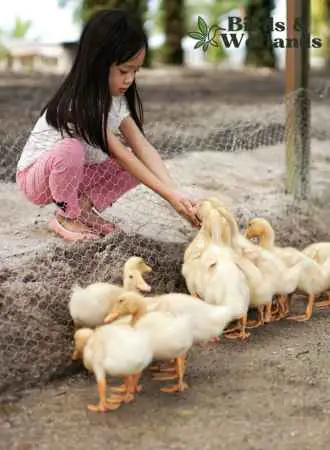
Feeding ducks bread can lead to nutritional deficiencies and health problems, and twist ties and other small objects can be a choking hazard. Brewer’s yeast can also cause health problems if fed in large quantities.
When feeding wild ducklings, it’s important to avoid feeding them too much food. Uneaten food can attract pests and other wild birds, and can also pollute the water. It’s best to feed ducklings in small amounts and remove any uneaten food after a few hours.
What to Feed Wild Ducks or Baby Ducks
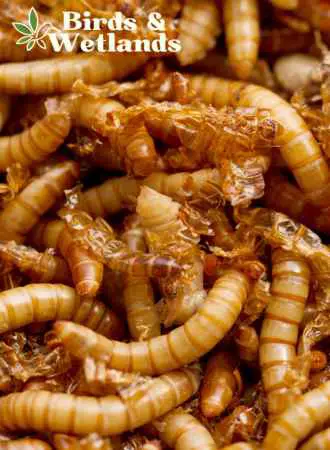
Wild ducklings typically eat a variety of foods found in their natural habitat, such as grass, berries, insects, small fish, seeds, flowers, and water plants. Mother ducks also provide their young with nutrient-rich yolk sacs for the first few days of their lives.
If you need to feed wild baby ducks, it’s important to provide them with a balanced diet that meets their nutritional needs. Ducklings should be fed a variety of fresh, un-medicated food and water. They should also be provided with grit, which helps them digest their food.
It’s important to note that ducklings should receive most of their nutrition from feed, and treats should be given sparingly. Overfeeding ducklings can lead to health problems, such as bowed legs or angel wing.
If you plan on feeding wild ducklings, it is important to provide them with the right food. Here are some of the best foods to feed wild ducklings:
Chopped lettuce: This is a great source of vitamins and minerals for ducklings.
Fresh fruit: Ducks love fruits like grapes, strawberries, and blueberries.
Small fish: If you have access to a pond or lake with small fish, this can provide extra protein for the ducklings.
Frozen peas: These are a great source of protein and can be thawed before feeding.
Layer feed: This is a specially formulated feed that is high in protein and nutrients for ducks.
Dried mealworms: These are a great source of extra protein for ducklings.

Black Larvae
High Nutritional Value: Rich in protein, calcium, and other essential nutrients.
Boosts Calcium Intake: With 50-75 times more calcium than mealworms

UCM Dried Mealworms
Nutrient-Dense: Packed with essential vitamins and minerals.
High Protein Content: With 53% protein,
Remember wild baby ducks will usually have a mother duck close by who knows how to feed them perfectly, only interfere and feed ducks or ducklings if they have been abandoned and their survival is in doubt.
Best Waterfowl Feed
Delightful Feeding Experience
Transform your backyard into a scenic waterfowl habitat and enjoy an interactive feeding experience with Natural Waterscapes Waterfowl Floating Food.

Pros
- Nutritious Food: Natural Waterscapes Waterfowl Floating Food is specifically designed to provide essential nutrients to waterfowl, including swans, geese, and ducks, helping them maintain a healthy diet.
- Convenient: The food comes in resealable packaging, making it easy to store and use as needed. It is also easy to handle and transport.
- Floating Formula: The floating formula of the food allows it to remain on the surface of the water, making it easier for waterfowl to eat and minimizing the risk of water contamination.
- Attracts Waterfowl: The food is formulated to attract various waterfowl species, including swans, geese, and ducks, to your pond, lake, or other water body, providing an opportunity to observe and enjoy these beautiful creatures.
- Environmentally Friendly: Natural Waterscapes Waterfowl Floating Food is made with environmentally friendly ingredients and does not contain any harmful preservatives, making it safe for both waterfowl and the environment.
Cons
- Shelf Life: The food’s shelf life may be limited compared to other types of waterfowl food due to its natural ingredients and lack of preservatives. This means you may need to use it up quickly after opening the package to prevent it from going bad.
What Not to Feed Wild Ducklings
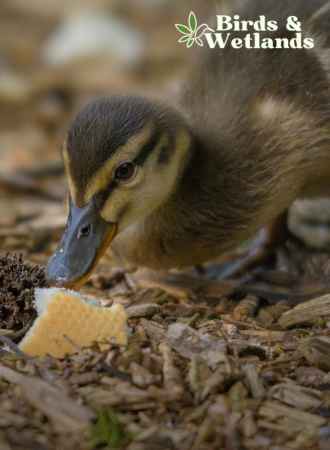
It is important to avoid feeding wild ducklings certain foods that can be harmful to their health. Here are some foods to avoid feeding wild ducklings:
Bread: Bread has little nutritional value and can cause health problems in ducks if fed in excess.
Junk food: Foods like chips, cookies, and donuts are not good for ducklings and can cause health problems.
Leftover food: Ducks should not be fed uneaten food from humans, as it may contain harmful ingredients.
White bread: This type of bread can cause a condition called “angel wing” in young birds, which can lead to bowed legs and other health problems.
Twist ties: These can be mistaken for food by ducks and can cause serious health problems if ingested.
Overall, feeding wild ducklings can be a fun and rewarding experience, but it’s important to provide them with the right food in the right amounts. By following these tips, you can help ensure that wild ducklings stay healthy and happy.
How to Feed Wild Ducklings
When feeding wild ducklings, it is important to do so in a way that is safe for both the ducks and the environment. Here are some tips on how to feed wild ducklings:
Use a food dish: This will help prevent the ducks from eating from the ground and ingesting harmful materials.
Feed in small amounts: Only feed the ducks what they can eat in a half hour to avoid overfeeding and wasting food.
Feed in a designated area: Feeding the ducks in a specific area will help prevent them from becoming too reliant on humans for food and disrupting the local ecosystem.
Provide fresh water: Ducks need access to fresh water to stay healthy and hydrated.
Best Overall Duck Feeder -FeatherEase Automatic Chicken Waterer & Feeder
Simplify Your Poultry Care with One Smart Solution!
Enhance your poultry care with the FeatherEase Automatic Chicken Waterer & Feeder, a convenient and efficient solution designed to keep your ducks and chickens well-fed and hydrated.

Pros
- Simplify your poultry care routine: Dual-function design combines an automatic waterer and feeder in one convenient unit.
- Save time and effort: Large feeder and waterer capacities reduce the need for frequent refill.
- Save money: Innovative no-waste feeding system minimizes feed spillage and waste.
- Long lasting: Food-grade, BPA-free materials ensure the safety and health of your poultry, while the durable constructio.
- Easy-to-assemble and maintain design simplifies the process of keeping your poultry hydrated and well-fed.
Cons
- Users with hard water may experience difficulty in separating the inner cup from the main cup of the waterer due to mineral buildup.
- The feeder’s holes may be too large for some users, allowing chickens to scatter food out, which could result in waste.
- The waterer may not function effectively in colder climates, requiring alternative solutions during the winter months.
By following these tips, you can help ensure that the wild ducklings in your area are receiving a healthy and balanced diet.
Best Duck Feed Pellets
Are you a duck owner looking for the perfect feed to keep your feathered friends happy and healthy? Look no further than Purina Duck Feed Pellets! With their nutritionally balanced formula and high-quality ingredients, these pellets are the ultimate solution for providing your ducks with the nutrition they need to thrive.
Pros
- Complete Nutrition: Purina Duck Feed Pellets are nutritionally balanced to provide all the essential vitamins and minerals that ducks need to stay healthy and strong.
- Easy to Digest: The pellets are specially formulated to be easy to digest, which makes them ideal for ducks of all ages.
- Promotes Growth and Development: With its balanced nutrition formula, Purina Duck Feed Pellets are designed to support healthy growth and development in ducks.
- Suitable for All Breeds: Whether you have domestic ducks or wild ducks, Purina Duck Feed Pellets are suitable for all breeds of ducks.
- Trusted Quality: Purina has been producing high-quality animal feed for over 100 years, so you can trust that your ducks are getting the best possible nutrition with Purina Duck Feed Pellets.
Cons
- Cost: Compared to other types of duck feed on the market, Purina Duck Feed Pellets can be slightly more expensive. However, many customers feel that the high-quality ingredients and balanced nutrition formula are worth the extra investment.
- Pellet Size: Some customers have noted that the pellet size of Purina Duck Feed Pellets can be quite large, which may not be suitable for smaller or younger ducks. However, many customers have reported that the pellets can easily be broken up or soaked in water to make them easier to eat.
What Do Wild Ducklings Eat?
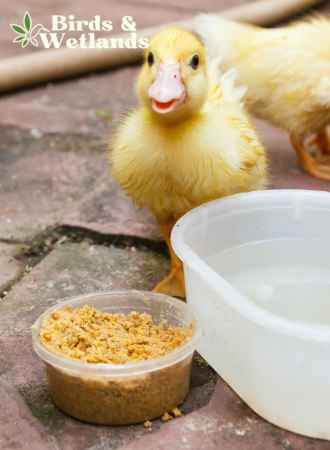
Wild ducklings have a varied diet, consisting of both plant and animal matter. They typically feed on insects, small fish, and various types of vegetation, such as grasses, berries, and seeds.
Here are some specific examples of what wild ducklings eat:
Insects: Ducklings will eat a variety of insects, including worms, beetles, and snails. They may also eat mosquito larvae, which can be found in stagnant water.
Small Fish: Ducklings will eat small fish if they are available. They will typically catch fish that are smaller than themselves.
Vegetation: Ducklings will eat a variety of vegetation, including grasses, berries, and seeds. They may also eat algae and water plants.
Grit: Ducklings need grit in their diet to help them digest their food. Grit is small stones or sand that the ducklings swallow to help grind up their food in their gizzards.
It is important to note that while wild ducklings have a varied diet, they should not be fed human food. Feeding them bread, for example, can cause health problems for the ducklings and can also attract predators to their location.
If you find a wild duckling that needs help, it is best to contact a wildlife rehabilitation center for advice on how to care for it. They can provide guidance on what to feed the duckling and how to help it grow strong and healthy.
FAQs on What to Feed Wild Ducklings
What should I feed a wild mallard duckling?
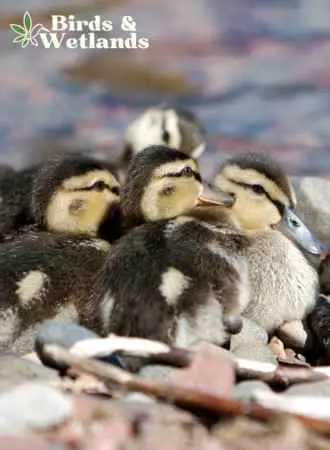
Feeding wild mallard ducklings should be done with caution, as it is best for them to learn to forage for natural foods. If you choose to offer ducklings food, provide a small amount of duck-specific feed or unseasoned, chopped greens to ensure they receive proper nutrition. Do not feed bread or other processed foods, as these can be harmful to a wild duck. If you see a baby duck, look around for other wild mallards before interfering.
Can I feed wild ducklings the same food as domestic ducks?
Although wild ducklings and domestic ducklings have similar nutritional requirements, it is essential to avoid feeding wild ducklings too much or foods that are not part of their natural diet. If necessary, offer a small amount of duck-specific feed or natural food sources, such as insects and greens.
Is leftover food safe for wild ducklings at the local park?
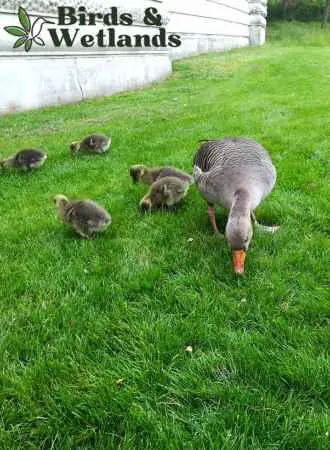
Feeding leftover food to wild ducklings is not recommended, as it may not be suitable for their nutritional needs and can cause health issues and can interfere with the duckling’s diet. Uneaten food can also attract pests and other wild birds, disrupting the natural ecosystem. Stick to natural food sources or duck-specific feed when helping wild ducklings.
How can I avoid overfeeding wild ducklings at a local pond?
To avoid overfeeding wild ducklings at a local pond, limit the amount and frequency of food you provide. Too much food can lead to health problems for the ducklings and disrupt the natural balance of the pond. Observe the ducklings from a distance and allow them to forage for their own food as much as possible.

